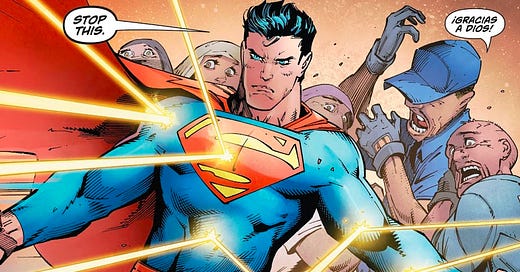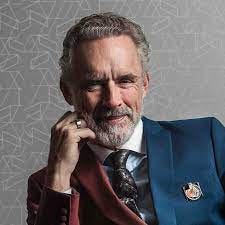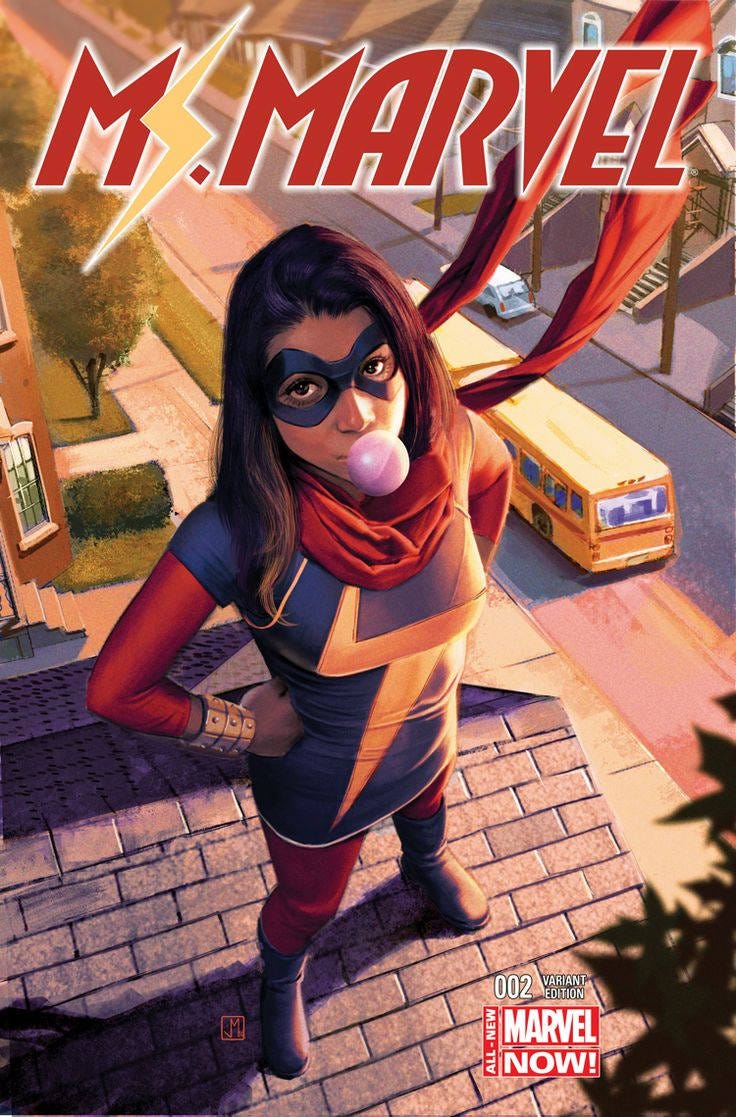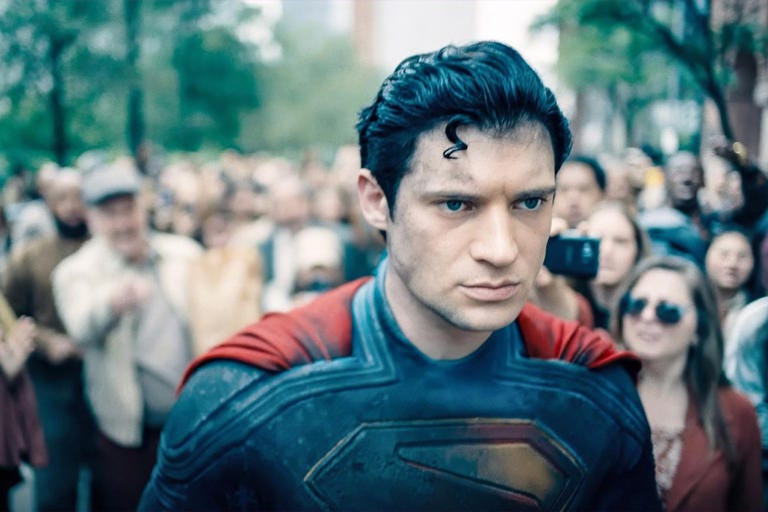
"But Now They're Getting Political!"
The rallying cry of the chronically unobservant. Suddenly their childhood heroes are full of feelings, fighting fascists, and (gasp) acknowledging marginalized people. It's not that these characters were ever apolitical; it's just that their politics were safely background noise when the villains were conveniently foreign, or brown, or carrying a hammer and sickle. But put a hijabi teenager or a queer refugee in the cape, and suddenly it's wokeism with a cape.
Let's review some of your favorite franchises and see just how long they've been "getting political" because spoiler alert: it's since always.
Captain America: Punched Nazis Before America Even Bothered
Captain America didn't debut with a handshake. In Captain America Comics #1 (March 1941), he straight-up cold-cocks Hitler on the jaw, months before the U.S. officially entered World War II. Jack Kirby and Joe Simon, both Jewish, weren't waiting for the State Department's permission slip to declare fascism bad.
The character's been side-eyeing American institutions ever since. During the Watergate era, he literally ditched the stars and stripes and became Nomad after uncovering corruption in a storyline transparently modeled after the Nixon administration. If Steve Rogers were real today, he'd be doxxed by Turning Point USA for being a deep state asset.
Superman: Undocumented and Unapologetic
You want to talk about immigration? Superman is the ultimate illegal alien. Kal-El was launched from a dying planet, crash-landed in Kansas, and adopted by kindly farmers who raised him with compassion, not a birth certificate. James Gunn recently reminded everyone that Superman is an immigrant story, and he wasn't being metaphorical.
Superman's origin is straight out of refugee literature. Zack Snyder's Man of Steel leans into this: Clark is bullied, othered, told to hide who he is, and when he finally reveals himself, humanity freaks out. Yet he still chooses to protect us, like the world's most benevolent undocumented worker. In Action Comics #900, he even renounces his U.S. citizenship to better serve global justice. That's not red-white-and-blue jingoism. That's cosmic-scale ethics.
The X-Men: Mutant Metaphor and the Illiteracy of Right-Wing Fans
From the start, the X-Men were created during the Civil Rights era as a big glowing metaphor for the marginalized, oppressed, and hated. Stan Lee said he wanted them to stand in for all minority groups, and while fans later compared Professor X and Magneto to MLK and Malcolm X, Magneto's character arc was actually shaped more directly by Menachem Begin's life trajectory: from Jewish refugee to revolutionary.
And yet, somehow, conservatives still want to pretend the X-Men are on their side. I've already taken a flamethrower to that nonsense previously, and the metaphor is still lost on the same folks who think the Mutant Registration Act was just good policy.
If you missed that God Loves, Man Kills is about Christian extremism, race-based hate, and state violence, congrats: you've misunderstood a 40-year-old comic written at a 10th grade reading level. Also worth noting: Jessie Drake, a trans allegory character, debuted in Marvel Comics Presents #150 in 1994, decades before Twitter made gender identity a culture war battleground. Keep pretending trans inclusion is new. I'll wait.

Black Panther: Anti-Colonialism with a Vibranium Budget
The Black Panther made his debut in Fantastic Four #52 (1966), which was not a subtle time in American racial politics. T'Challa is the king of a never-colonized African nation, smarter than Tony Stark, and richer than Bruce Wayne. He doesn't need your aid packages. Wakanda is a raised middle finger to every colonial fantasy you were spoon-fed in high school history class.
The Black Panther movie goes even harder. Killmonger is what happens when the African diaspora is abandoned, abused, and radicalized. The film forces the audience to sit with questions about historical injustice, inherited trauma, and whether isolation is ethical in the face of global suffering. Here's the timeline that breaks MAGA brains: Black Panther the character debuted in July 1966, while the Black Panther Party formed in October 1966. Both actually drew inspiration from the same source: the Lowndes County Freedom Organization's black panther logo. So while they weren't directly connected, they emerged from the same civil rights zeitgeist, making the comic even more politically charged than originally intended.

Wonder Woman: Feminism with a Sword
Created by William Moulton Marston (who, when he wasn't inventing the lie detector, was advocating for female empowerment and living in a polyamorous household), Wonder Woman was designed to be a feminist icon from day one.
She's from an all-female society, fights with compassion, and will absolutely crush your skull if needed. In the 1940s, she was fighting Nazis. In the 1980s and 2000s, she was dealing with queer identity, gender politics, and the ethics of power. If your idea of Wonder Woman is a hot chick with a rope fetish, congrats: you've been watching the movie with the sound off. (But you’re not far off with the rope fetish…)

Watchmen: You Were Never Supposed to Idolize Rorschach
Alan Moore's Watchmen is a masterclass in saying the quiet part out loud. Nixon is still president. The U.S. is a dystopia. Superheroes are government stooges or psychotic loners. Rorschach is not a gritty truth-teller; he's a far-right incel with hygiene issues and a messiah complex. His journal reads like 4chan if it had footnotes.
Dr. Manhattan is the emptiness of power without morality. The Comedian is American war crimes in a trench coat. The whole story is an autopsy of American exceptionalism, and yet somehow, Rorschach became a right-wing meme hero. If you walked away from Watchmen thinking, "Yeah, this guy gets it," you might also think Tyler Durden was a financial advisor and Jordan Peterson would make a great dad replacement.
Ms. Marvel: Jersey Girl, Muslim, Superhero
Kamala Khan is the kind of American story that conservative comic fans pretend doesn't exist: Pakistani-American, Muslim, superhero, and teenager. She juggles community pressure, Islamophobia, generational trauma, and high school all while trying not to explode. Her debut in 2014 had the usual online trolls frothing, but her comics were a massive hit. Turns out people like seeing heroes who look like them. Shocking.
Her stories tackle everything from drone strikes to microaggressions to identity crises. You want wholesome values? She's got those in spades. You want to be mad because she prays? That's your issue, not hers.
The Punisher: Your Cop Car Stickers are Embarrassing
Let's clear this up: The Punisher is not your conservative mascot. Frank Castle is a deeply broken man whose entire philosophy is rooted in the failure of institutions. Garth Ennis practically writes neon signs in his run saying, "THIS IS NOT A ROLE MODEL."
Marvel even had Frank confront cops misusing his symbol, telling them they're part of the problem. But sure, slap his skull on your squad car while ignoring every word that's ever come out of his mouth. That's like quoting Batman to defend Jeff Bezos.
Star Wars: The Rebellion Was Always Antifa
Somehow, the most on-the-nose space fantasy of all time still gets misread by fans who think the Empire were just misunderstood job creators. The Empire was based on Nazis. The Rebels were multicultural guerrilla fighters. The whole thing is a love letter to insurgent resistance.
George Lucas modeled the original trilogy on anti-fascist, anti-war sentiment, especially opposition to the Vietnam War. The prequels? A civics lesson about how democracies die when you trade liberty for security and clap like trained seals. And yes, I already covered the mind-melting wrongness of right-wing Star Wars takes in in that same previous Substack piece as before. Spoiler: if you identify with the guys in the white armor, you're the baddie.
Superman Again: James Gunn Gets It
James Gunn gets it. He said the quiet part loudly and clearly: Superman is the outsider who chooses kindness. He's a powerful immigrant who could destroy everything but chooses to help. He's not truth, justice, and the American way because of blind patriotism. He's the aspirational version of what America should be. Bigots don't get to own him just because he has a spit curl.
Final Thoughts: If You're Just Noticing Politics in Comics, That's On You
Superheroes have always reflected the times and cultures that birthed them. What's changed isn't the politics; it's who's allowed to be powerful on the page. If your problem with comics started when the protagonists stopped being straight white men with jawlines sharp enough to cut glass, maybe it's time to ask why that bothers you.
And if you're still clutching your pearls over James Gunn daring to say the word "immigrant" in the same sentence as Superman, take a nap. The rest of us have capes to iron and fascists to punch.









